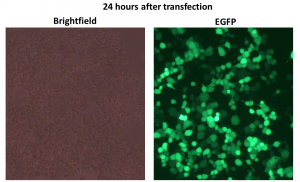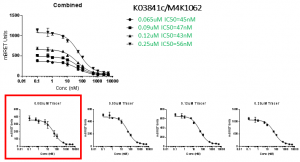The EC50 of Tracer-6908 with ACVR1-c-nanoLuc and ideal conditions for the target engagement assay have been determined in a previous experiment. However, it is still necessary to verify that the IC50 values determined in the assay are closed enough approximation to the actual IC50 values of the compounds. If the IC50 values are strongly influenced by the concentration of Tracer-6908 used, multiple assays with progressively lower Tracer-6908 will need to be performed. The actual IC50 of the compounds can then be estimated by plotting the Tracer-6908 concentrations against the corresponding IC50 values and regressing to no Tracer-6908. To address this, multiple nanoBRET target engagement assays were setup with increasing concentrations of Tracer-6908 with the same serial dilution of M4K1962 (starting from the EC50 of 65nM).

EGFP signal in transfected cells. HEK293 were transfected efficiently. Cells can be harvested for nanoBRET assay.

NanoBRET IC50 of compound M4K1062 using increasing concentrations of Tracer-6908 with ACVR1/ALK2-c-nanoLuc transiently expressed in HEK293 cells. Final chosen Tracer-6908 concentration is bracketed in red rectangle.
Good news! The IC50 values determined using low concentrations of Tracer-6908 are good approximation of the actual compound IC50. 65nM Tracer-6908 is chosen for future nanoBRET ACVR1/ALK2 assays because it will be most cost efficient. Even though the maximum signal at this tracer concentration is lower, the standard deviation among experimental replicates remained small, indicating that the quality of the data is not compromised.
For full experimental details, please refer to the Zenodo post.
